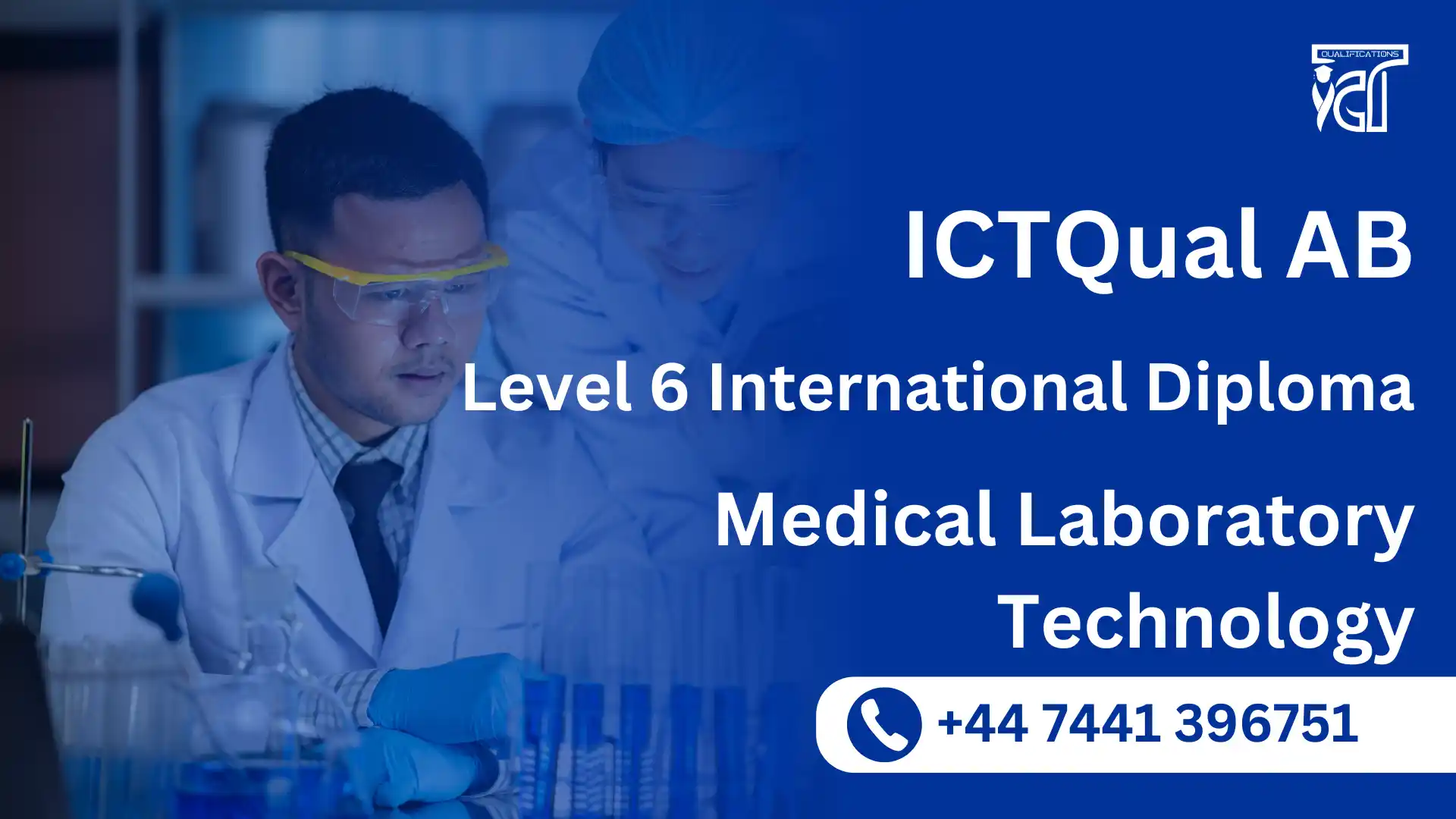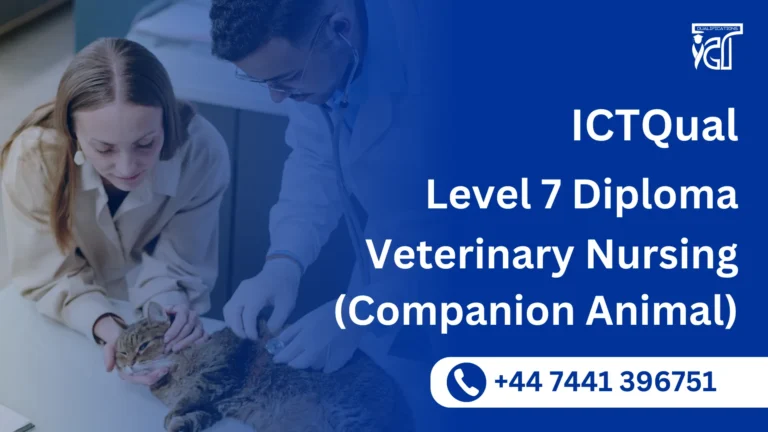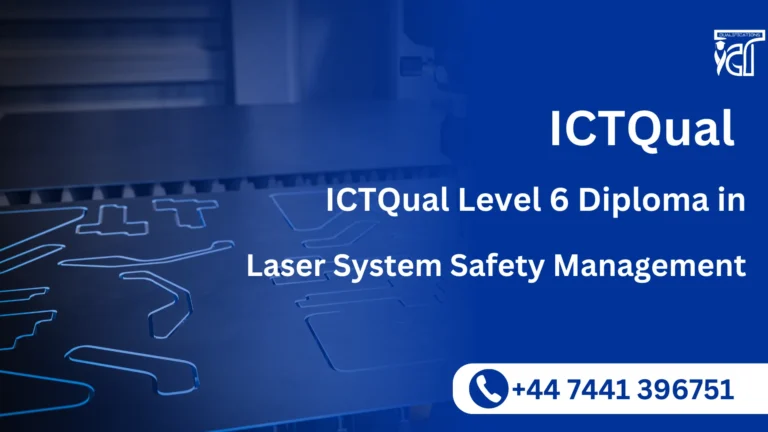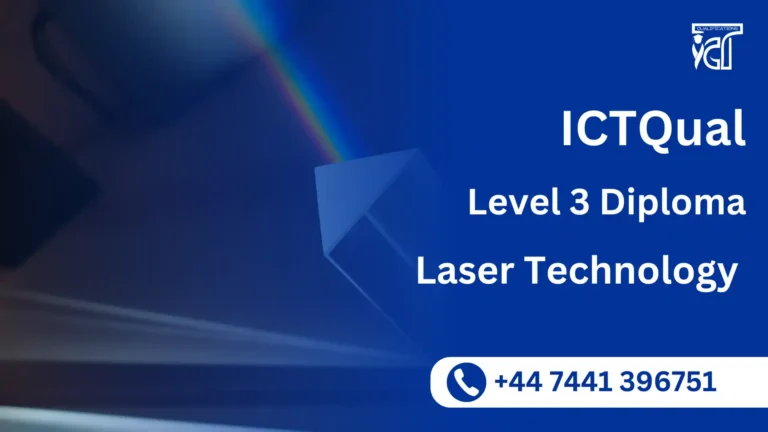The ICTQual AB Level 6 International Diploma in Medical Laboratory Technology is a comprehensive three-year programme, structured around 360 credits, designed to equip learners with advanced expertise in modern laboratory practices. This programme offers a perfect blend of theoretical knowledge and practical skills, preparing learners to excel in a wide range of medical laboratory and diagnostic environments.
Ideal for fresh learners entering the healthcare sector as well as experienced professionals seeking career advancement, the diploma provides in-depth training in laboratory techniques, clinical diagnostics, microbiology, biochemistry, and molecular biology. Learners gain proficiency in handling sophisticated laboratory equipment, conducting accurate analyses, and ensuring quality control and safety standards, making them highly competent in professional laboratory settings.
Upon completion, learners are empowered with the skills to interpret complex laboratory results, support clinical decision-making, and contribute to healthcare research and diagnostics. Career opportunities include roles such as medical laboratory technologist, clinical laboratory analyst, research assistant, and positions in hospital laboratories, diagnostic centres, and pharmaceutical companies.
Key benefits of this programme include enhanced employability, practical skill development, and preparation for leadership and specialist roles in laboratory services. Learners also develop critical thinking, analytical capabilities, and evidence-based problem-solving skills, ensuring they remain competitive in a rapidly evolving global healthcare industry.
Whether beginning a professional journey or advancing an existing career, this Level 6 International Diploma in Medical Laboratory Technology provides learners with a solid platform for success, fostering expertise, confidence, and long-term professional impact.
ICTQual AB Level 6 International Diploma in Medical Laboratory Technology
This qualification, the ICTQual AB Level 6 International Diploma in Medical Laboratory Technology 360 Credits – Three Years, consists of 36 mandatory units.
Year 1: Foundation in Medical Laboratory Technology
- Fundamentals of Medical Laboratory Science
- Human Anatomy and Physiology
- General Biochemistry
- Principles of Microbiology
- Immunology and Serology
- Introduction to Pathology
- Basic Haematology
- Laboratory Safety and Quality Assurance
- Computer Applications in Laboratory Practice
- Communication Skills for Healthcare Professionals
- Medical Ethics and Professional Conduct
- Research Methods in Health Sciences
Year 2: Intermediate Laboratory Applications
- Clinical Biochemistry Techniques
- Advanced Microbiology
- Diagnostic Parasitology
- Molecular Biology Basics
- Blood Banking and Transfusion Science
- Clinical Haematology
- Histopathology Techniques
- Cytology and Cytogenetics
- Instrumentation and Analytical Methods
- Epidemiology and Public Health
- Environmental and Food Microbiology
- Clinical Laboratory Management
Year 3: Advanced Laboratory Specialisation
- Advanced Molecular Diagnostics
- Clinical Immunology
- Advanced Histopathology
- Clinical Virology
- Toxicology and Forensic Science
- Advanced Parasitology
- Automation in Medical Laboratories
- Advanced Transfusion Medicine
- Laboratory Data Analysis and Interpretation
- Emerging Diseases and Diagnostic Innovations
- Research Project / Dissertation
- Professional Practice and Internship
Learning Outcomes for the Level 6 International Diploma in Medical Laboratory Technology 360 Credits – Three Years:
Year 1: Foundational Knowledge
By the end of Year 1, learners will be able to:
Fundamentals of Medical Laboratory Science
- Understand the principles and scope of medical laboratory science.
- Identify roles and responsibilities of laboratory professionals.
- Apply basic laboratory procedures in a clinical context.
Human Anatomy and Physiology
- Explain the structure and function of major body systems.
- Relate physiological processes to disease diagnosis.
- Recognise normal vs. abnormal anatomical features.
General Biochemistry
- Apply biochemical principles in clinical laboratory analysis.
- Perform basic biochemical tests with accuracy.
- Interpret biochemical results for medical relevance.
Principles of Microbiology
- Describe microbial structure and classification.
- Apply aseptic techniques in laboratory practice.
- Recognise the role of microorganisms in infection and health.
Immunology and Serology
- Explain immune system functions and responses.
- Conduct basic serological tests for diagnosis.
- Interpret laboratory findings related to immunity.
Introduction to Pathology
- Define key pathological concepts and disease mechanisms.
- Recognise tissue changes associated with disease.
- Correlate pathology findings with clinical symptoms.
Basic Haematology
- Perform routine blood investigations.
- Identify normal and abnormal blood cell morphology.
- Relate haematological data to common conditions.
Laboratory Safety and Quality Assurance
- Apply laboratory safety guidelines effectively.
- Identify and minimise risks in laboratory operations.
- Implement basic quality assurance protocols.
Computer Applications in Laboratory Practice
- Use basic software for laboratory record-keeping.
- Apply digital tools in data entry and analysis.
- Understand the role of IT in laboratory management.
Communication Skills for Healthcare Professionals
- Demonstrate effective communication in healthcare settings.
- Apply professional skills in reporting and teamwork.
- Adapt communication for patients and medical staff.
Medical Ethics and Professional Conduct
- Follow ethical principles in laboratory practice.
- Maintain confidentiality in handling patient data.
- Demonstrate professionalism in clinical environments.
Research Methods in Health Sciences
- Understand basic research design in health sciences.
- Collect and analyse simple data sets.
- Present findings using standard research methods.
Year 2: Intermediate Proficiency
By the end of Year 2, learners will be able to:
Clinical Biochemistry Techniques
- Perform advanced biochemical investigations.
- Calibrate and maintain biochemical instruments.
- Analyse results for disease diagnosis and monitoring.
Advanced Microbiology
- Identify pathogenic microorganisms using culture methods.
- Apply diagnostic microbiology techniques accurately.
- Interpret laboratory findings for clinical application.
Diagnostic Parasitology
- Detect and identify human parasites microscopically.
- Perform diagnostic tests for parasitic infections.
- Relate parasitology results to clinical cases.
Molecular Biology Basics
- Explain DNA, RNA, and protein functions.
- Apply basic molecular diagnostic techniques.
- Relate molecular findings to health and disease.
Blood Banking and Transfusion Science
- Conduct blood grouping and compatibility tests.
- Apply safe transfusion protocols.
- Manage storage and records in a blood bank.
Clinical Haematology
- Perform diagnostic haematology procedures.
- Identify abnormalities in blood cell counts and morphology.
- Relate results to haematological disorders.
Histopathology Techniques
- Prepare and stain tissue samples for examination.
- Recognise pathological features in histological slides.
- Operate equipment used in histopathology.
Cytology and Cytogenetics
- Prepare cytological samples for analysis.
- Identify cellular abnormalities under the microscope.
- Explain genetic variations and their clinical significance.
Instrumentation and Analytical Methods
- Operate laboratory instruments for diagnostic use.
- Apply principles of analytical techniques.
- Maintain accuracy through proper calibration.
Epidemiology and Public Health
- Explain the principles of disease distribution and control.
- Apply epidemiological data in health planning.
- Relate laboratory findings to public health initiatives.
Environmental and Food Microbiology
- Test food and water samples for contamination.
- Apply microbial testing methods for safety assurance.
- Interpret laboratory results for environmental health.
Clinical Laboratory Management
- Apply principles of laboratory organisation and workflow.
- Manage resources, inventory, and staff effectively.
- Implement quality control systems in laboratory operations.
Year 3: Advanced Specialization and Application
By the end of Year 3, learners will be able to:
Advanced Molecular Diagnostics
- Apply molecular diagnostic methods such as PCR.
- Interpret genetic and molecular test results.
- Evaluate applications of molecular diagnostics in healthcare.
Clinical Immunology
- Perform advanced immunological assays.
- Interpret immune disorders through laboratory testing.
- Apply immunology methods in monitoring diseases.
Advanced Histopathology
- Process complex tissue samples for diagnostics.
- Identify malignant and pre-malignant conditions.
- Correlate histopathological results with patient outcomes.
Clinical Virology
- Detect viruses using diagnostic laboratory techniques.
- Perform laboratory tests for viral infections.
- Relate virology findings to epidemic control.
Toxicology and Forensic Science
- Analyse biological samples for toxic substances.
- Apply forensic testing methods for investigations.
- Interpret toxicology results in clinical and legal contexts.
Advanced Parasitology
- Identify rare and complex parasitic infections.
- Apply advanced diagnostic methods in parasitology.
- Evaluate the impact of parasites on global health.
Automation in Medical Laboratories
- Operate automated laboratory systems.
- Integrate digital technology into diagnostic processes.
- Assess the efficiency of automation tools.
Advanced Transfusion Medicine
- Conduct specialised transfusion procedures.
- Manage emergency and rare transfusion cases.
- Monitor and evaluate post-transfusion reactions.
Laboratory Data Analysis and Interpretation
- Apply statistical tools in laboratory data analysis.
- Interpret diagnostic data for clinical decisions.
- Present laboratory findings in professional reports.
Emerging Diseases and Diagnostic Innovations
- Identify new and re-emerging infectious diseases.
- Apply innovative diagnostic methods in outbreaks.
- Evaluate global health responses through laboratory data.
Research Project / Dissertation
- Design and execute independent research in laboratory science.
- Analyse and interpret scientific results effectively.
- Present research findings in a structured report.
Professional Practice and Internship
- Apply theoretical knowledge in real laboratory settings.
- Demonstrate competence in advanced laboratory procedures.
- Work effectively as part of a professional healthcare team.
1. Advanced Industry Knowledge
- Comprehensive understanding of medical laboratory techniques, clinical diagnostics, microbiology, biochemistry, and molecular biology.
- Equips learners with up-to-date knowledge of laboratory protocols, safety standards, and regulatory compliance.
- Develops a strong foundation for interpreting complex laboratory data and supporting clinical decisions.
- Prepares learners for emerging trends and innovations in laboratory technology and diagnostics.
- Ensures learners are confident in applying theoretical knowledge to practical scenarios.
2. Enhanced Career Opportunities
- Access to roles such as medical laboratory technologist, clinical laboratory analyst, research assistant, and diagnostic specialist.
- Opportunities in hospitals, diagnostic centres, research laboratories, and pharmaceutical companies.
- Prepares learners for leadership, supervisory, or specialist positions within laboratory services.
- Enhances employability locally and internationally in the growing healthcare and laboratory sectors.
- Opens pathways to advanced studies or professional certifications in laboratory science and healthcare.
3. Practical and Applied Skills
- Hands-on training in laboratory equipment handling, sample analysis, and quality control procedures.
- Development of critical laboratory skills, including accurate measurement, specimen processing, and data interpretation.
- Emphasis on safety, hygiene, and compliance with international laboratory standards.
- Learners gain confidence in performing diagnostic tests and supporting clinical outcomes.
- Encourages problem-solving and precision in a practical, real-world laboratory environment.
4. Leadership and Professional Development
- Strengthens analytical thinking, ethical decision-making, and professional responsibility.
- Prepares learners for supervisory roles and team leadership in laboratory settings.
- Builds communication skills essential for collaboration with clinicians, researchers, and healthcare teams.
- Develops a professional mindset aligned with global healthcare standards.
- Encourages continuous professional development and lifelong learning in laboratory science.
5. Global Recognition and Credibility
- Completion of a structured, internationally recognised Level 6 programme.
- Demonstrates professional commitment and expertise in medical laboratory technology.
- Enhances reputation and credibility in healthcare and research environments.
- Provides a qualification valued by employers and academic institutions worldwide.
- Supports international career mobility and global professional recognition.
6. Long-Term Career Impact
- Equips learners with transferable skills for diverse healthcare and laboratory settings.
- Strengthens analytical, technical, and critical-thinking abilities for long-term professional growth.
- Prepares learners to adapt to evolving healthcare technologies and laboratory innovations.
- Supports ongoing career progression and access to high-demand roles in the healthcare sector.
- Provides a solid foundation for continued studies, research, or specialised professional pathways.
The ICTQual AB Level 6 International Diploma in Medical Laboratory Technology is designed for learners who wish to build a strong career in clinical diagnostics and laboratory science. This programme caters to both fresh learners entering the healthcare sector and experienced professionals aiming to enhance their skills and advance their careers. Learners gain practical expertise, theoretical knowledge, and industry-ready competencies, preparing them for a variety of roles in medical laboratories and healthcare settings.
1. Aspiring Laboratory Professionals
- Fresh learners seeking foundational knowledge in medical laboratory technology and clinical diagnostics.
- Individuals interested in laboratory procedures, microbiology, biochemistry, and molecular biology.
- Learners aiming to start a career as medical laboratory technologists or laboratory assistants.
- Students looking for a structured, internationally recognised programme.
- Those preparing for further studies or specialisation in laboratory sciences.
2. Healthcare Practitioners and Technicians
- Professionals with prior experience in healthcare, nursing, or laboratory work seeking advanced expertise.
- Individuals aiming for senior, supervisory, or specialised roles in medical laboratories.
- Learners updating their knowledge on modern laboratory techniques, quality control, and diagnostic standards.
- Practitioners wanting to formalise their skills with an internationally recognised Level 6 diploma.
- Professionals aiming to enhance research, analytical, and clinical diagnostic competencies.
3. Career-Focused Individuals
- Learners motivated to improve employability in hospitals, diagnostic centres, research laboratories, and pharmaceutical companies.
- Individuals targeting specialist roles in clinical diagnostics, laboratory management, or research.
- Learners seeking international career opportunities and professional recognition.
- Professionals aiming to progress into leadership or technical expert roles.
- Those wishing to leverage the qualification for long-term career growth.
4. Research and Analytical Enthusiasts
- Learners passionate about laboratory research, experimental analysis, and evidence-based diagnostics.
- Individuals developing advanced analytical, problem-solving, and data interpretation skills.
- Learners contributing to innovation in laboratory science, quality assurance, and clinical studies.
- Those interested in pursuing research-focused or academic roles in healthcare and diagnostics.
- Individuals aiming to strengthen precision, accuracy, and methodological expertise in laboratory practice.
5. Lifelong Learners and Continuous Developers
- Professionals committed to ongoing learning and staying updated with evolving laboratory technology.
- Learners seeking structured programmes combining theoretical knowledge, practical application, and industry insight.
- Individuals focused on personal growth alongside professional development.
- Those developing leadership, ethical decision-making, and advanced laboratory skills.
- Learners preparing to adapt to future innovations in laboratory science and healthcare diagnostics.
6. Global and International Focus
- Learners seeking internationally recognised credentials that enhance career mobility.
- Individuals aiming to meet global laboratory standards and regulatory requirements.
- Professionals aspiring to work in multinational diagnostic companies, research institutions, or hospitals.
- Learners developing cross-cultural understanding of healthcare laboratory practices.
- Individuals valuing a qualification that demonstrates both professional credibility and practical competence worldwide.
Completing the ICTQual AB Level 6 International Diploma in Medical Laboratory Technology equips learners with the knowledge, practical skills, and professional credibility to advance their careers and access higher-level opportunities in healthcare and laboratory science. This diploma provides a strong foundation for long-term career growth, global mobility, and further academic pursuits.
1. Career Advancement in Medical Laboratory Science
- Eligible for senior or specialised roles in hospital and clinical laboratories.
- Opportunities as medical laboratory technologists, clinical laboratory analysts, research assistants, or diagnostic specialists.
- Preparation for supervisory or leadership positions within laboratory services.
- Enhanced employability in diagnostic centres, pharmaceutical companies, and healthcare institutions.
- Access to high-demand roles requiring advanced laboratory and analytical expertise.
2. Research and Development Opportunities
- Involvement in laboratory research, clinical trials, and diagnostic innovation.
- Contribution to evidence-based healthcare initiatives and quality assurance projects.
- Development of advanced analytical, data interpretation, and problem-solving skills.
- Preparation for roles in research laboratories, academic institutions, or regulatory bodies.
- Opportunities to participate in cutting-edge developments in medical laboratory technology.
3. Academic and Professional Growth
- Foundation for pursuing postgraduate diplomas, master’s degrees, or specialised certifications.
- Pathways to specialise in areas such as clinical diagnostics, molecular biology, or laboratory management.
- Enhancement of professional credentials and continuous professional development (CPD) opportunities.
- Access to international professional networks and collaborative healthcare communities.
- Increased recognition and credibility in global healthcare and laboratory environments.
4. Global Career Mobility
- Qualification recognised internationally, supporting career opportunities across borders.
- Ability to meet industry standards in diverse healthcare systems and regulatory environments.
- Opportunities to work in multinational laboratories, research institutions, and hospitals worldwide.
- Prepares learners for a dynamic and evolving global healthcare market.
- Develops transferable skills applicable in various healthcare and laboratory settings.
Entry Requirements
The ICTQual AB Level 6 International Diploma in Medical Laboratory Technology is designed to accommodate both fresh learners and experienced professionals. Entry requirements ensure that learners are well-prepared to successfully engage with the programme and achieve their career goals.
1. Minimum Age
- Learners must be at least 18 years old at the time of enrolment.
- Mature learners above the minimum age with relevant experience are also eligible.
2. Educational Background
- Fresh learners: Completion of secondary education (High School or equivalent) with strong grades in science subjects such as Biology, Chemistry, or Physics.
- Experienced professionals: Relevant work experience may be considered in lieu of formal qualifications, provided verifiable documentation is available.
3. Experience
- Fresh learners: No prior work experience required; learners are expected to complete 36 structured assignments covering theory and practical skills.
- Experienced professionals: Minimum of six years verifiable experience in medical laboratory, clinical diagnostics, healthcare, or related sectors. Experience should demonstrate competence in laboratory procedures and healthcare practices.
4. Language Proficiency
- Proficiency in English is required to effectively understand course materials, complete assignments, and communicate in professional contexts.
- Learners should have the ability to read, write, and comprehend English at an academic level suitable for a Level 6 programme.
- If English is not the first language, learners may need to provide evidence of language competency (e.g., IELTS, TOEFL, or equivalent) as per the centre’s guidelines.
5. General Requirements
- Basic computer literacy for accessing online learning resources, submitting assignments, and conducting research.
- Commitment to adhering to laboratory safety, professional ethics, and quality standards.
- Dedication to completing the three-year, 360-credit programme successfully.
Register Now
Qualification Process
Qualification Process for the ICTQual AB Level 6 International Diploma in Medical Laboratory Technology
- Self-Assessment:
Begin by evaluating your eligibility to ensure you meet the qualification requirements, including work experience, knowledge, and language proficiency. - Registration:
Complete your registration by submitting the required documents, including a scanned copy of a valid ID, and paying the registration fee. - Induction:
An assessor will conduct an induction to confirm your eligibility for the course and explain the evidence requirements. If you do not meet the criteria, your registration will be cancelled, and the fee will be refunded. - Assignments & Evidence Submission:
Provide all assignments and the necessary evidence based on the assessment criteria outlined in the course. If you are unsure of the required evidence, consult with the assessor for guidance on the type and nature of evidence needed. - Feedback and Revision:
The assessor will review your submitted evidence and provide feedback. Evidence that meets the criteria will be marked as “Criteria Met,” while any gaps will be identified. You will be asked to revise and resubmit if needed. - Competence Evidence:
Submit final evidence demonstrating that all learning outcomes have been met. This evidence will be marked as “Criteria Met” by the assessor once it is satisfactory. - Internal Quality Assurance (IQA):
The Internal Quality Assurance Verifier (IQA) will review your evidence to ensure consistency, quality, and compliance with standards. - External Verification:
The IQA will submit your portfolio to ICTQUAL AB External Quality Assurance Verifiers (EQA) for final confirmation. The EQA may contact you directly to verify the authenticity of your evidence. - Certification:
Upon successful completion of all checks, ICTQUAL AB will issue your official certificate, confirming that you have attained the ICTQual AB Level 6 International Diploma in Medical Laboratory Technology.







